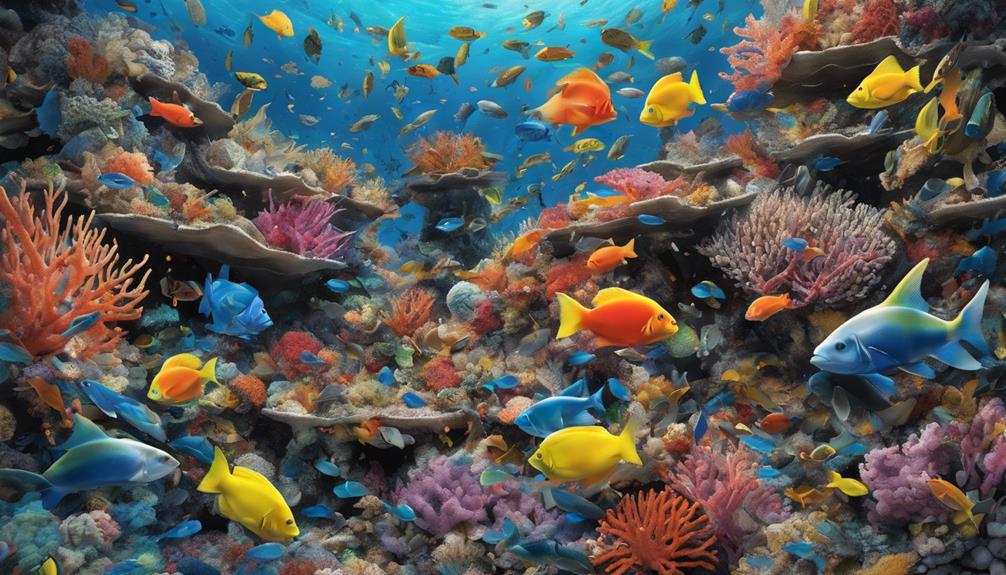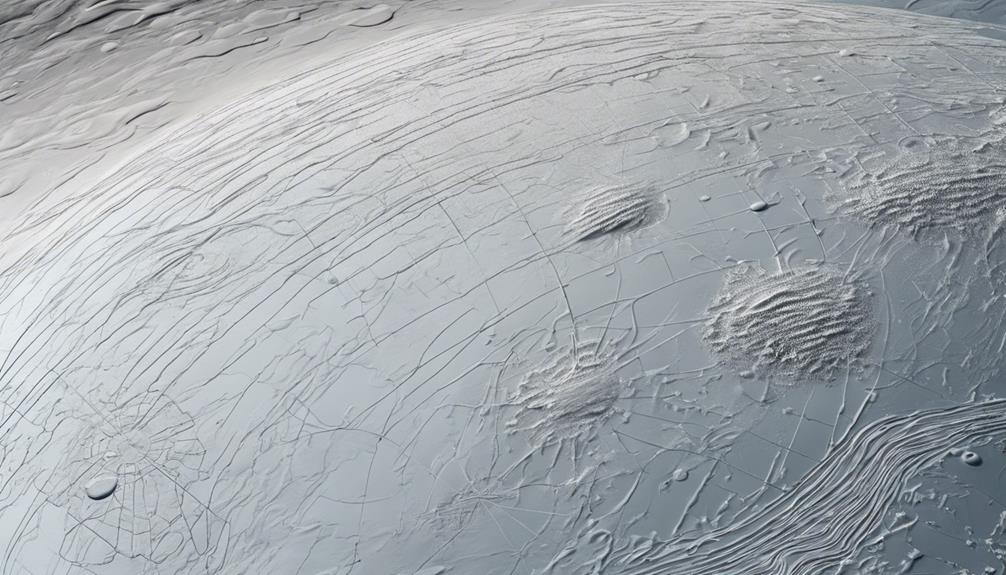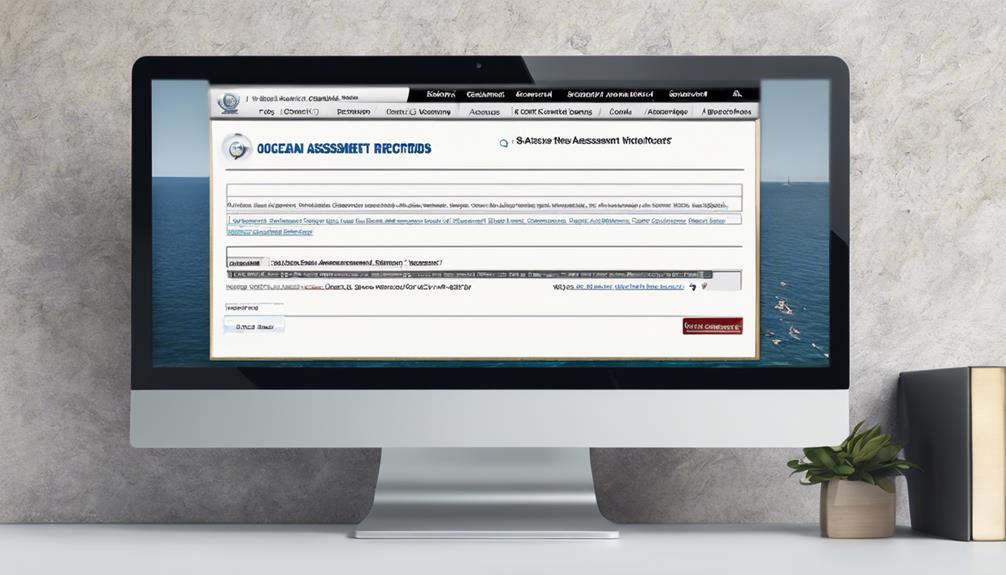Have you ever pondered the real magnitude of human influence on the expansive global seas?
The World Ocean Assessment sheds light on the environmental challenges faced by our oceans and the ongoing efforts to conserve their delicate ecosystems.
As we delve into the intricate balance of marine life and human activities, it becomes evident that our actions today will shape the future of our oceans for generations to come.
Let's explore the critical findings and conservation initiatives that are vital for safeguarding the health and sustainability of our oceans.
Key Takeaways
- Urgent need for comprehensive conservation strategies to address ocean threats.
- Assessment highlights pollution, overfishing, and climate change impacts.
- Challenges identified for promoting marine biodiversity and sustainability.
- Aids decision-makers in aligning strategies with Sustainable Development Goals.
Environmental Threats to World Oceans
Plastic pollution, with an estimated annual input of 8 million tons, presents a severe threat to the world's oceans. This pollution not only physically harms marine life but also contributes to the overall degradation of marine ecosystems. Additionally, ocean acidification, stemming from excessive carbon dioxide absorption, disrupts the delicate balance of marine environments by hindering the ability of organisms to form calcium carbonate shells essential for their survival. Overfishing and destructive fishing practices further exacerbate the situation, leading to a decline in marine biodiversity and disrupting the intricate web of life in the oceans.
Moreover, escalating coral bleaching events, driven by climate change, have severe repercussions on coral reefs, impacting the habitats of countless marine species. Oil spills, exemplified by disasters like the Deepwater Horizon incident, have long-lasting effects on marine environments, causing significant ecological and economic damage. Addressing these environmental threats through effective conservation efforts is crucial to safeguarding the health and resilience of our oceans for future generations.
Findings of World Ocean Assessment

Escalating environmental pressures on the world's oceans, as revealed by the World Ocean Assessment, emphasize the urgent need for comprehensive conservation strategies to mitigate the detrimental impacts of human activities on marine ecosystems. The assessment provides a detailed insight into the current state of the marine environment, highlighting the alarming effects of human activities such as pollution, overfishing, and climate change. It underscores the critical importance of conservation and sustainable use practices to address these threats effectively.
Through global reporting and assessment, the World Ocean Assessment identifies key challenges and opportunities for promoting marine biological diversity and integrating socioeconomic aspects into conservation efforts. It serves as a valuable tool for decision-makers to develop strategies aligned with the Sustainable Development Goals (SDGs) and ensure the long-term health of our oceans. By offering an integrated assessment of marine ecosystems, this report aids in fostering a deeper understanding of the intricate relationships between human actions and the ocean environment, guiding us towards informed and impactful conservation actions.
Human Impact on Ocean Ecosystem
Human activities, including overfishing, pollution, and climate change, have exerted significant impacts on ocean ecosystems worldwide.
Overfishing has led to the depletion of fish stocks and disruptions in marine food chains, affecting the balance of ocean ecosystems.
Pollution, especially plastic pollution, poses a severe threat to marine life, with millions of tons of plastic entering the oceans annually. Additionally, ocean acidification, a result of increased carbon dioxide absorption, endangers marine organisms and coral reefs.
The overexploitation of marine resources further exacerbates these issues, contributing to declines in biodiversity.
Climate change effects, such as rising sea temperatures and levels, stress and alter ocean ecosystems, impacting the distribution and abundance of marine species.
Urgent conservation efforts are needed to address these human impacts on the ocean environment and safeguard the health and resilience of marine ecosystems for future generations.
Ongoing Conservation Efforts

Conservation strategies currently in place focus on enhancing marine biodiversity through the establishment of marine protected areas (MPAs). Initiatives targeting plastic pollution reduction aim to safeguard marine life by implementing campaigns, regulations, and raising public awareness. Sustainable fishing practices, including quotas and monitoring systems, are crucial in preventing overfishing and preserving fish stocks. Restoration projects such as coral reef restoration and mangrove reforestation play a significant role in conserving marine habitats and species. Collaborative research and monitoring programs provide essential data for informed decision-making, enhancing marine ecosystem protection. By working together, we can ensure the sustainability of our oceans for future generations.
| Conservation Effort | Description |
|---|---|
| Marine Protected Areas | Safeguard marine biodiversity and ecosystems. |
| Plastic Pollution Reduction | Implement campaigns, regulations, and awareness programs to protect marine life. |
| Sustainable Fishing Practices | Utilize quotas and monitoring systems to prevent overfishing and preserve fish stocks. |
| Restoration Projects | Conduct initiatives like coral reef restoration and mangrove reforestation for habitat conservation. |
Protecting and Preserving Ocean Ecosystem
Oceanic ecosystems face imminent threats from pollution, overfishing, and habitat destruction, resulting in biodiversity loss and ecosystem degradation. To protect and preserve these vital ecosystems, several key strategies are being implemented:
- Establishing Marine Protected Areas (MPAs): Over 15,000 MPAs globally cover approximately 7% of the ocean, safeguarding critical habitats and species from human impacts.
- Implementing Sustainable Fisheries Management: Practices like setting catch limits and reducing bycatch are crucial for preserving fish stocks and maintaining the balance of marine ecosystems.
- Addressing Climate Change Impacts: Ocean acidification and coral bleaching, intensified by climate change, underscore the need for mitigation strategies to protect marine biodiversity and resilience.
- Leveraging International Agreements: Collaborative efforts such as the Paris Agreement and the Convention on Biological Diversity play a pivotal role in promoting conservation initiatives and addressing global threats to ocean health.
Frequently Asked Questions
What Is the World Ocean Assessment of the United Nations?
We view the World Ocean Assessment as a crucial initiative by the United Nations to comprehensively evaluate the state of the world's oceans.
It involves a global review of marine environmental, economic, and social aspects to assess the ocean's condition.
This assessment engages hundreds of scientists to provide a thorough evaluation, emphasizing the urgent need for global action to protect the oceans' sustainability.
What Are the 4 Major Threats to Ocean Life?
We can't ignore the 4 major threats to ocean life:
- Pollution from land-based sources like plastics and sewage
- Overfishing practices
- Climate change impacts such as ocean acidification and rising sea temperatures
- Habitat destruction from coastal development and coral reef degradation
These dangers endanger marine species and ecosystems, demanding urgent conservation efforts to safeguard the health of our oceans.
What Do You Think Are the Three Most Important Issues Facing Our Coasts and Oceans Globally and the People and Communities That Depend on Them?
We believe the three most critical issues facing our coasts and oceans globally and the communities dependent on them are rising sea levels, plastic pollution, and overfishing. These threats impact coastal communities and marine ecosystems, jeopardizing food security, biodiversity, and livelihoods.
It's imperative to address these challenges through sustainable practices, conservation efforts, and international collaboration to safeguard our oceans for future generations.
Which Is a Major Environmental Concern for Our Oceans?
Plastic pollution, with its staggering 8 million tons yearly, is a major headache for our oceans. It's like a never-ending party where plastic refuses to leave. This uninvited guest threatens marine life and ecosystems, causing chaos at our underwater soiree.
We need to step up our game to clean up this mess before it's too late. Let's be the ocean's superheroes and tackle this plastic problem head-on!
Conclusion
In conclusion, the World Ocean Assessment highlights the urgent need for conservation efforts to protect our oceans from the environmental threats posed by human activities.
By understanding the findings of the assessment and recognizing the impact on ocean ecosystems, we can work towards sustainable management practices.
Let's envision a future where the vast depths of the ocean are teeming with vibrant marine life, thriving in a balanced and protected environment for generations to come.
Eugene brings a fresh, dynamic voice to our platform as one of our talented Writers. Specializing in research-driven content, he explores the latest findings in psychology and personal growth, translating them into actionable insights for our readers. Eugene’s work is fueled by a curiosity about what makes us tick and a desire to help others unlock their potential.










